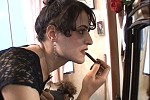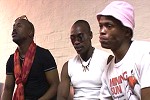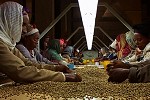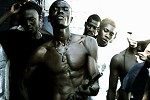 Shadows off the beaten path
Shadows off the beaten path< < D O C S > >
last update 25.Mar.07
See also: SHADOWS FILM FESTIVAL
 R E V I E W B Y R I C H C L I N E
R E V I E W B Y R I C H C L I N E
 Everything about this astute and involving documentary is surprising, not least the fact that Iran is a haven for transsexuals, with more liberalised laws than even in Western European countries.
Everything about this astute and involving documentary is surprising, not least the fact that Iran is a haven for transsexuals, with more liberalised laws than even in Western European countries.
In Islam, if something isn't specifically prohibited in the Koran, then it is permissible. Therefore Ayatollah Khomeini granted permission for people to change gender in Iran, claiming it wasn't against the will of Allah. This comes with legal rights and benefits, including a new birth certificate, although culturally it also brings huge problems.
The film follows two transsexuals. Mahtab is a good-humoured young "man" preparing for the operation, still living with her parents (not thrilled, but supportive). Living as a woman before the operation, Mahtab has a boyfriend, Mohsen, who is standing by her. They want to create a family and live according to Islamic law ("God created me like this"); Mahtab is prepared to wear a veil the rest of her life. We follow her through her surgery and out the other side, to a brand new birthday.
Meanwhile, we meet Sayeh, whose boyfriend is the pre-op female-to-male Afshin, and they are living their own life. When they got together they swapped clothes, and they have no plans to undergo hormone therapy or gender reassignment surgery, but they live as members of the opposite sex.
Both of these women face severe ridicule and limited opportunities. In Mahtab's case, her surgery means that she will now inherit half as much as a daughter than she as a son. But what's most interesting is the way transgender issues are accepted in such a strongly religious country. While never regarded as normal, the pain these people live with is recognised and dealt with.
The Dutch filmmakers strike a thoughtful tone, using a fly-on-the-wall style along with low-key and often emotional interviews with both women and their families. We also hear from a doctor, a religious expert and the woman who started the ball rolling when she met Khomeini in the 1970s. Everyone stresses honesty and religious uprightness while confronting a thorny issue.
In addition to the subject matter, the film also provides a vivid view of Iran's streets, shops, clinics, markets and more. This could be anywhere in the world, and as a result the film cuts through the issue with an intensely personal examination of families openly facing a difficult situation with warmth and real love.
with Mahtab, Sayeh, Mohsen, Afshin, Kariminia, Fereydoun
 release UK Mar.07 bevff
release UK Mar.07 bevff06/Iran Column Film 1h03
BIRDS EYE VIEW FEST
14.Feb.07 bevff
 R E V I E W B Y R I C H C L I N E
R E V I E W B Y R I C H C L I N E
 This documentary explores a specific subculture in Soweto where gay men are community role models. Gentle and observational, director Tsimong says he wanted the film to be a simple and honest reflection of their lives. And it's rather more than that.
This documentary explores a specific subculture in Soweto where gay men are community role models. Gentle and observational, director Tsimong says he wanted the film to be a simple and honest reflection of their lives. And it's rather more than that.
The three central figures are Gigi, a drag goddess and TV host; Chix, a beefy body builder with a girlfriend who accepts his bisexuality; and DK, a funeral director who's also a choreographer. All are known as "Beulahs", men who are openly gay and fabulous with it. And community is like a big family, as everyone hangs out together--men, women, kids--seeking mutual understanding and grappling with their complex sexuality.
The fly-on-the-wall approach is accompanied by voiceovers from the director and the guys the camera is following. As a result, the film is exploratory, revealing and honest. For these men, being gay is integral to who they are; they don't necessarily need to make it obvious. They're like everyone else--good and bad, faithful or loose. And it's simply not fair that people condemn them for what they are rather than what they do. In this society most gay men must leave home, because it's rare for parents to accept their sexuality. And running away is the only alternative to suicide.
These kinds of stories are echoed in every country on earth, although these guys don't seem to know that. And nothing is remotely straightforward for them, as they still want to settle down as families with children. As they prepare for a gay pride drag show, they remind us that demanding rights isn't about sex, it's about love, relationships, identity and dignity.
The film is nicely shot and smoothly assembled, although the electronic score is fairly cheesy. Tsimong lets the scenes drift naturally from language to language, intriguingly revealing the culture and everyday life, including the banality of holding down a job in between all this fabulousness. Like others around the world, these men have a long way to go before they are fully accepted in their society, but they persevere in their quest to live life in full colour. Besides being intriguing and telling, this is also inspirational.
with Somizi 'Gigi' Mlongo, Joseph 'Chix' Matlala, Lucky 'DK' Jabane, Motsamai Tladi, Sechaba Tladi, Nonosi Molefi, Kgotso Motlou, Emmanuel, Vusi Mduli, Craig Linfoot, Justin Elliot, Themba
 release US May.06 newfest; UK Mar.07 llgff
release US May.06 newfest; UK Mar.07 llgff06/South Africa 52m

2.Mar.07 llgff
 R E V I E W B Y R I C H C L I N E
R E V I E W B Y R I C H C L I N E
 MUST-SEE
MUST-SEE
 Filmmakers Marc and Nick Francis travel explore the global coffee trade in this pure, observational documentary. It never preaches at all, yet it's unforgettably strong stuff.
Filmmakers Marc and Nick Francis travel explore the global coffee trade in this pure, observational documentary. It never preaches at all, yet it's unforgettably strong stuff.
After oil, coffee is the world's largest trading commodity, but the people who actually grow the crops remain locked in a cycle of poverty. While Western corporations post record profits, coffee growers are being asked to sell their beans for less and less. The film centres on Ethiopia, birthplace of coffee, and the trader Tadesse Meskela, who's bypassing the system to provide fair wages for his co-operative of coffee farmers and apply profits into community projects like schools and health care. We also follow him to London and Seattle, where he markets his products to the world, stopping to glimpse the New York market where global prices are set and Italy's Illy coffee empire, which only buys coffee off the commodities exchange.
All of this is filmed in a completely unobtrusive manner that merely lets us see what's happening as savvy editing contrasts the luxuriant indifference of Starbucks café culture with the grim realities of the coffee producing communities. If we feel any guilt, it's because we recognise that we're to blame for this disparity, that the entire global marketplace is designed to keep the developing world in its place while we enjoy the proceeds.
The raw fact is that Africa, in particular, is getting poorer by the day due to colonial greed. Western aid is actually keeping these people dependent and subservient, and the irony is that as they switch to more lucrative crops, usually illicit drugs, not only will the coffee supply dry up, but our cultures will be increasingly undermined by addiction and crime. And we can't say we didn't bring this on ourselves.
The filmmakers never spell this out; they don't have to. What they do tell us is that if Western corporations allow African traders to keep just 1 percent more of the profits, they'll earn more than five times what's given in aid each year. And of course this isn't only happening in Africa. And it's not just about coffee. This is subtle, insightful cinema that demands an audience that's willing to engage their brains. And their hands.
with Tadesse Meskela, Barry Coates, Ernesto Illy, Joe O'Neill, Ahmed Mahamedi, Sam Mpasu, Simon Wakefield, Jacques Habib, Robert Zoellick, Fabiana Pozar, Rosa Meskela
 release US 6.Oct.06,
release US 6.Oct.06, UK 8.Jun.07
06/UK 1h18
LONDON FILM FEST
BERLINALE
7.Mar.07
 R E V I E W B Y R I C H C L I N E
R E V I E W B Y R I C H C L I N E
 MUST-SEE
MUST-SEE
 For a documentary, this film has one of the most gripping narratives of the year. Clearly, the material was a gift for Danish filmmaker Leth; his access to the characters and volatile situations makes us wonder how he and his crew survived the shoot.
For a documentary, this film has one of the most gripping narratives of the year. Clearly, the material was a gift for Danish filmmaker Leth; his access to the characters and volatile situations makes us wonder how he and his crew survived the shoot.
The UN once called the Cité Soleil section of Port-au-Prince the most dangerous place on the planet. In 2004, it's ruled by the Chimeres (ghosts), gangs of heavily armed thugs who unofficially worked for President Aristide. Two of the five gang chiefs are brothers: 2pac is a charismatic gangster and rapper, while Bily is more politically savvy. Their different views often put them in conflict with each other, especially since they both fancy the French relief worker Lele. But when Aristide flees the country, the new government (with the help of American troops) targets the Chimeres.
There are times in this film when we feel it can't possibly be a documentary. The story is so powerfully dramatic, with characters who overflow with energy and life-threatening situations that are absolutely terrifying. And the tensions between 2pac and Bily are shockingly potent, as they both clash and bond as brothers, gang leaders and love rivals. All while their already unmanageable society is torn apart around them.
Haiti is one of the poorest nations on earth, and the people of Cité Soleil live without education and basic services. Guns are everywhere, and as one man says, "We don't need peace; we need food and schools." To them, peace means massacre, because without guns they can't protect themselves from the corrupt police, military, rebels--anyone who wants to stop them. In other words, "Power is a gun in Haiti."
Leth assembles this story expertly, with a bristling pace and striking observational emotion and humour. The music by Wyclef Jean (who also appears briefly) and Jerry Wonda Duplessis interweaves brilliantly with 2pac's rapping to capture the mood of the place. And while the film gets a little chaotic with all the internal conflicts, it's also hugely involving: tense and stirring, and a seriously important comment on the places in the world we like to pretend don't exist.
with Winson '2Pac' Jean, James 'Bily' Petit Frère, Lele Senlis, Wyclef Jean, Andy Apaid, Charles Baker, Louis Jordel Chamblain, Buteur Matayer, Guy Philippe, Leon Charles, Jean-Bertrand Aristide
 release US 29.Jun.07,
release US 29.Jun.07, UK 20.Jul.07
06/Denmark 1h28
TORONTO FILM FEST
6.Feb.07


See also: SHADOWS FILM FESTIVAL | SHORT FILMS
© 2007 by Rich Cline, Shadows
on the Wall